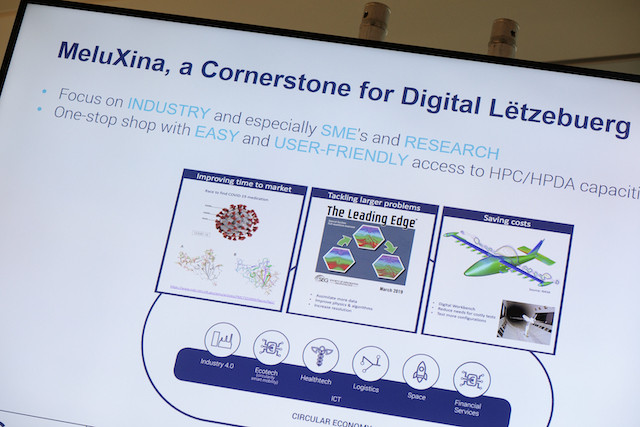The Meluxina supercomputer--built by French IT company Atos--will form part of the so-called EuroHPC project, a network of eight supercomputers scattered across Europe and headquartered in Luxembourg.
“If we hadn’t done this project, we would have risked companies not investing a single cent in research,” Bettel said during a press conference, saying Luxembourg lacked capacity for businesses to carry out sophisticated digital operations. “It’s not just nice to have. It’s an absolute necessity,” added economy minister Franz Fayot.
Around two thirds of the supercomputer’s capacity will be commercialised in Luxembourg, with industry, research but also SMEs and start-ups among the targeted users for the high-performance computer, which will have a capacity of 10 petaflops.
To match the performance of one second of a 1 petaflops computer, you would have to perform one calculation every second for 31.6 million years.
“We are trying to align with the current prices in the market,” said Roger Lampach, CEO of the newly created entity LuxProvide, which will manage the Meluxina computer. Start-ups and SMEs lacking the necessary cash to use the computer can apply for existing research and innovation grants via the economy ministry, Fayot told Delano.
The supercomputer--which will be located in Bissen--cost €30.4m, two thirds of which were paid for by the Luxembourg state. The European Commission funded the other third, with 35% of the computing power to be made available to the 32 countries taking part in the EuroHPC joint venture.
Much of the technology will be outmoded within the next five to six years, Lampach said. By then, it is hoped that LuxProvide--a subsidiary of data centre operator LuxConnect--will be self-sufficient. Fayot ruled out another investment of the size made to kick off the project.
Lux role in EU cloud project

Prime minister Xavier Bettel at the press conference on 29 September. Photo: Matic Zorman / Maison Moderne
“We are positioning the continent between America and Asia,” said Bettel, adding that it was high time Europe caught up with their computing capacity. The European Commission is planning on spending €8b on high-performance computing between 2021 and 2030.
Meluxina will include a unit dedicated to cloud technology, with Luxembourg hoping for a prominent role in the Gaia-X project. Pitched by France and Germany, Gaia-X aims to create a unified cloud and data ecosystem protected by EU laws.
With the EuroHPC head office in Luxembourg, the grand duchy wants to position itself as an EU hub for the bloc’s digital institutions, Bettel said. A European Commission decision to withdraw one of its executive agencies from Luxembourg last year reopened discussions over the country’s role as a seat of the European institutions.
Luxembourg is pushing for a bigger digital role, Bettel said, in addition to being home to the Court of Justice and the European Union, the European Public Prosecutors Office and financial institutions such as the European Investment Bank, the European Investment Fund, among others.
LuxProvide is in the process of recruiting 20 specialists to operate Meluxina but also run a so-called competence centre. The latter will help provide knowledge and skills to businesses and researchers wanting to use the supercomputer.
Meluxina will be delivered later this year and become operational spring 2021.
